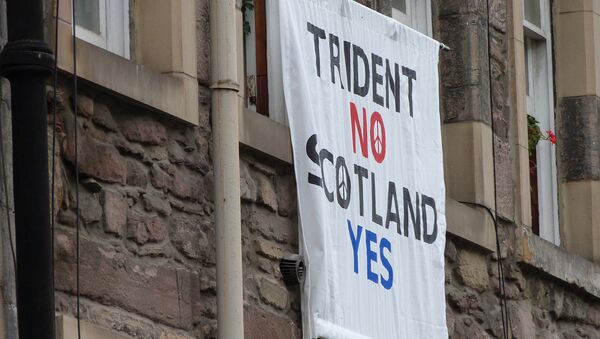The Trident issue is to be brought up in Westminster's House of Commons by the Scottish National Party (SNP), following the release of a report by 25-year-old Able Seaman William McNeilly, who expressed concern over the program's safety, labeling Trident a "disaster waiting to happen."
#TridentWhistleblower not an isolated incident — report by @ScottishCND puts the report by McNeilly in context http://t.co/H5UEXBFRoP
— CND (@CNDuk) May 28, 2015
The 18-page report, released over the Internet, said that there were "serious security and safety breaches" associated with of the UK's nuclear deterrence system, which consists of four submarines, based in Faslane, Scotland.
#TridentWhistleblower and the safety of British submarines — new Scottish CND report — http://t.co/hI1pCL6xQB
— Scottish CND (@ScottishCND) May 28, 2015
Following the release of the report, McNeilly, from Belfast, Northern Ireland, reportedly went on the run before handing himself to authorities, where he was held in a military establishment by Ministry of Defense (MoD) officials.
A subsequent MoD investigation found that many of McNeilly's concerns were unfounded, with defense secretary Michael Fallon saying that many of the claims were "either factually incorrect or the result of mis or partial understanding."
The final whistle has blown on Trident, says CND: http://t.co/nAOgmDx8O8 pic.twitter.com/KbNBHeehPk
— CND (@CNDuk) May 17, 2015
However, Kate Hudson, general secretary for activist group, Campaign for Nuclear Disarmament (CND), raised questions over the swiftness of the MoD's findings, telling Sputnik they needed greater investigation.
"The speed with which the Ministry of Defense has concluded its investigation into the allegations by Able Seaman William McNeilly is of great concern," she said.
"Serious and wide-ranging questions about the security of Britain's nuclear weapons system were raised and deserve rigorous scrutiny, especially when put in the context of other known safety breaches."
McNeilly Won't be Persecuted — Assange
With the UK's nuclear deterrent system an issue taken very seriously by the British government, McNeilly's arrest triggered fears among some that the 25-year-old may end up in a similarly difficult legal situation to other whistleblower figures such as Julian Assange and Edward Snowden.
Should we be worried about #TridentWhistleblower claims? Yes. @johnborrie: http://t.co/2slHQ9GwMf pic.twitter.com/IqSXW81ddn
— Chatham House (@ChathamHouse) May 23, 2015
However, given the Scottish National Party's (SNP) strong political support in Scotland and vehement opposition to the renewal of Trident, particularly in Scottish waters, it has been suggested that officials may not persecute McNeilly, as to avoid further angering the Scottish general public, and to try and quell independence rhetoric.
WikiLeaks founder Julian Assange, speaking in a Democracy Now news program, said that the British government wouldn't want a high profile case like McNeilly's associated with Trident.
"If you look at this from the Scottish perspective, England put all its nukes and nuclear processing in Scotland, in Faslane, making it a nuclear target, but also making it a potential place of a nuclear spill, a nuclear accident."
Assange believes that the UK military could either take a political action for McNeilly's revelations, or prosecute him for being away without leave, put him in prison for 28 days, and give him a dishonorable discharge, as a way to dampen the conflict.
"They're going to go for him under AWOL… It appears that the UK government is heading down this direction of trying to not have a big, high-profile court case, which would probably be held in Scotland and further inflame the Scottish independence movement."



